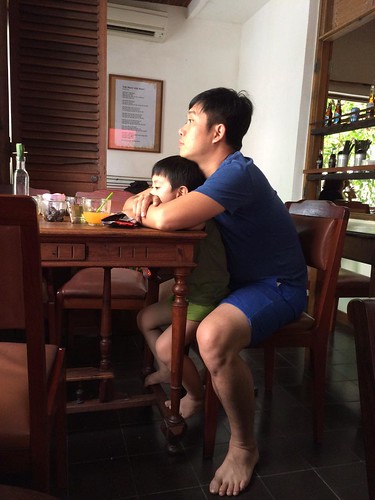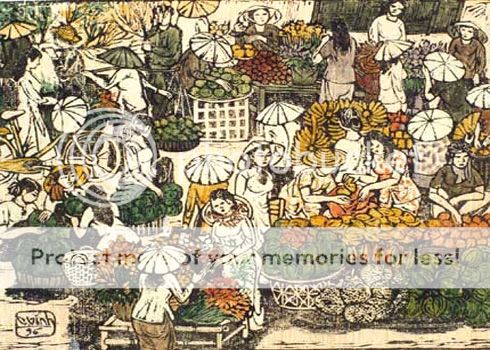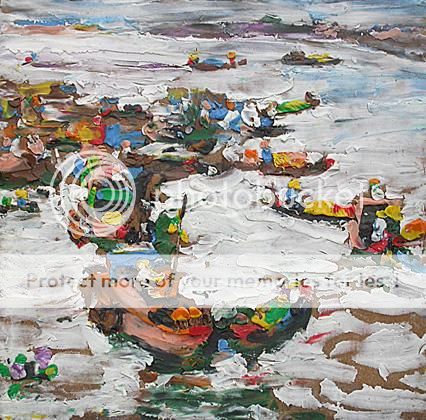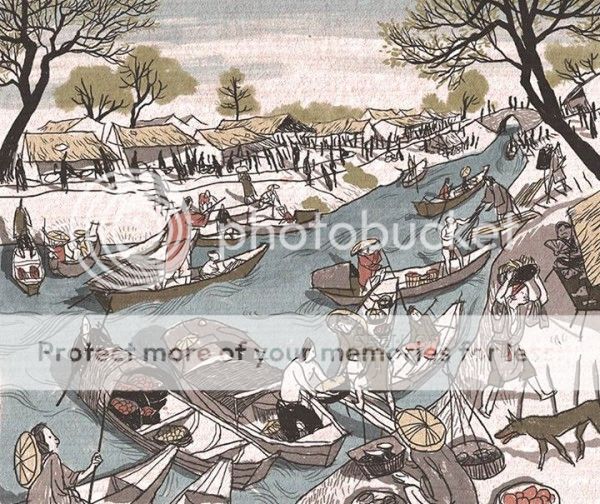Chia sẻ về kinh nghiệm của bán hàng, cảm xúc về cuộc sống gia đình hoặc chỉ là một quyển sách đã từng đọc
Chiến Phan
Thứ Sáu, 27 tháng 1, 2017
[Musing of life] CHỢ (5) – Một tình yêu - Market (5) A love
Chủ Nhật, 22 tháng 1, 2017
Vạn vật bất biến!?
Phần còn lại vẫn là chờ đợi bao kẻ đổi thay để thích nghi với sự thay đổi.
Thứ Sáu, 20 tháng 1, 2017
Tâm thức người bán!
Thứ Năm, 19 tháng 1, 2017
[Truyện] Ra đi hay trở về, anh vẫn theo em!
THE DAY WE WALKED THE SAME PATH
He: "Saigon has changed so much, hasn't it, darling?" The man let his gaze drift through the fading afternoon sun toward the far bank, where new buildings had sprouted like majestic white palaces.
She: "We must call it Ho Chi Minh City now, dear!" The woman nudged him gently with her elbow, a soft smile dancing with the wind that stirred the water like frolicking children. At that hour, the river lacked the ships carrying people back to the coastal city, leaving behind a peaceful current and birds soaring mid-sky. Freedom.
He: "What is the difference, really? Everyone has the right to keep the name they love for this land. To me, it is still Saigon, even if… it has changed more than a little." The man pulled his gaze back to the woman, her smile as light as a bird in flight. Cars began to hum in rhythm with horns on a stretch of road that was starting to embrace more souls.
She: "Yes. From Dong Khoi back to Tu Do, Khoi Nghia to Cong Ly, then through Quoc Te to the Turtle Lake. Everything changed, starting with the names! But it’s true, it’s still all right here, never leaving, no matter where people go." The woman lightly pulled her cardigan over her thin shoulders as shouts rang out from a segment of the road that was beginning to imprison even more people.
She: "Thank you." Her eyes glistened as the man took his grey-and-black plaid jacket and draped it over her frail shoulders. The fading sun spilled a golden trail down the river as small ripples called out to the shore.
He: "For what?" The man asked, his gaze bewildered, the lines of time etched deeper into his brow.
He: "For coming back to Saigon with me!" The woman smiled, her face dusted with the glow of the setting sun, her eyes—lined by the kohl of time—deep and enduring.
Those eyes had once made the man of sixty years ago fall hopelessly in love at a corner of Tu Do Street.
Those eyes had once brimmed with tears, speaking to him amidst a sky of scattered birds and shattered fates, trembling before a choice: "Leave Saigon behind, my love!" Back then, the man only let his cigarette smoke drift into a corner of the Tu Do sky.
One final sunset.
The man had once thought that of the place he stood—the vault of too many memories from a passing era. From a brat running wild through alleys woven between different skin colors, to a youth with a mind in turmoil during the time of fluttering flags and leaflets that blanketed the sky, calling for resistance and national struggle.
He thought he had cast it all behind on the day he shouldered his weathered backpack to head for that distant horizon, starting a new chapter. There, he found his happiness. A small family with three children, all successful by Western standards. He was intoxicated by praise and envy, yet only he felt something "different" every afternoon while sitting in his wicker chair, looking out at the silent yard surrounding the wooden house. There, the afternoon wind whispered, and the only sound was the clinking inside as she prepared tea so they could sit and watch the clouds together.
One spring afternoon in that distant land!
"Xa xứ" (Exile)—two words that almost only existed for the man and the woman. The children didn't care for their mother tongue; to them, it was merely the language the man used with the woman, something forced upon them in childhood to get acquainted. "Xa xứ"—two words that didn't exist for the youngsters who had grown up during their visits to the man and the woman.
The youngsters spoke to one another in the language of the country where they were raised. They knew where the man and woman grew up on a map through his stories and the photos he guarded like personal treasures—until the new era began, when such images were easily found on forums or with a few clicks. The youngsters stopped listening to his tales or looking at his photos, assets that had depreciated to zero.
The youngsters went together to places that recalled painful days. A few times. They joined the crowds on that "distant land" with banners and flags filling the streets, claiming to be the ones in pain despite never having imagined what that pain actually felt like. They spoke to each other in the language of the country where they were raised about such things. A few words of curse and contempt, of disdain, reached his ears. The youngsters no longer listened to his stories or looked at the photos he guarded like an asset that would never lose its value.
One spring afternoon in that distant land!
The man saw the shadow of Spring step out from inside the house, wearing an áo dài he hadn't seen in ages. Her thin shoulders emerged from a boat-neck collar that trembled slightly in the restless garden breeze. There was something different in that wooden house in that distant sky; the man hurried to support the woman, fearing the wind might accidentally crush her fragile frame—a frame that was beginning to accept involuntary acts, like standing frozen in a corner of the house or garden until he called her name.
The man immediately went online and booked a one-way ticket. Destination: Vietnam. He packed his faded backpack into a suitcase while the woman smiled. After a few seconds of thought, he left the photos he had guarded like an unblemished treasure on the table.
One spring afternoon, sun spilling over!
To the right of the railing, a woman was releasing ashes into the wind over the river. The man thought her face looked familiar; perhaps they had been on the same flight.
To the left of the railing, music drifted from a tea shop along the riverbank.
"And the spring rhythmically returns with the swallows... The normal season, the joyful season has now arrived... That dream of spring is arriving for the first time... With smoke drifting on the river, and a rooster crowing at noon by the bank..."
The man pulled the woman into his arms. He whispered: "Whether leaving or returning. I will always follow you."
Thứ Bảy, 14 tháng 1, 2017
Thanh Xuân nơi nao hay Người tình không bao giờ phản bội?
(Ảnh: Sưu Tầm)
[Nhật ký của cha] Merci, ông già & con chữ [Dad's diary - Merci, the old man & language]
Ai rồi cũng phải lớn! Ông già nhận ra điều đó khi ngồi ly trà cúc còn ủ hơi nóng ở một đêm cuối hạ, lắng nghe thằng nhóc Merci nói bằn...

-
Ai rồi cũng phải lớn! Ông già nhận ra điều đó khi ngồi ly trà cúc còn ủ hơi nóng ở một đêm cuối hạ, lắng nghe thằng nhóc Merci nói bằn...
-
"Lagom không phải là khước từ những thú vui trong cuộc sống, Lagom là khi chúng ta tận hưởng—mọi thứ—vừa đủ, lành mạnh và cân bằng....
-
Quẳng vali qua một góc phòng, nó nằm vật ra chiếc giường lót drap trắng muốt của khách sạn sau một ngày dài vật lộn với công việc để đến ...

















